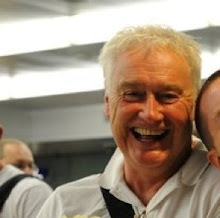Kevin Spacey’s timing is exemplary.
Not just in his personal performance but in bringing to the Old Vic such a dynamic production of the 1955 American war horse ‘
Inherit The Wind’ - a courtroom drama based on the true-life story of a young Tennessee school teacher arraigned for promoting the evolutionary theories of Charles Darwin against the orders of a Christian fundamentalist school board.
Written in the shadow of the McCarthy trials it is topical today because of the ongoing battle between religious right-wingers in the US who have repackaged their anti-Darwinist stance into a fresh campaign to coerce schools into teaching ‘
Intelligent Design’ (by the hand of God) instead of evolution as an approved scientific theory of the origin of man.
It makes Madonna’s Kabbalist babbling look almost rational by comparison, and it’s coming to a courtroom near you pretty soon as they
extend their campaign into the UK.
This play has a special resonance for me because, in my tortured youth wrangling with my parents about whether I should be allowed to 'go on the stage' or press on to University, 'Inherit the Wind' marked my 17-year old professional debut in the Harrogate Repertory Company's production. It's perhaps the phase that taught me there was no money in acting, since whatever I earned barely covered the fares for the last bus home each night.
I was pleasantly surprised how much of the dialogue I remembered, and the gospel songs, as taught to us by our unofficial chorus-mistress Zara Nutley, later language school owner Mrs Courtenay in the popular TV rubbish 'Mind Your Language'. I tried to Google some of the other actors from the show, Adam Kuryakin (possibly the first 'out gay man' I'd encountered in Harrogate) and Peter Codyre, or director Barry Howard, but I guess they're all dead.
In the meantime, enjoy the bareknuckle bout in 20’s Tennessee where Spacey is impeccable as the veteran lawyer Henry Drummond (real life Clarence Darrow) twanging his suspenders and twisting the witnesses’ words to barnstorming effect. He’s much shoutier than Spencer Tracy in the Oscar-winning 1960 movie, the internalised anger contorting his already hunched body into a shape that may physically recall Charles Laughton, but continuously commands the stage.
It’s possible Spacey was impressed by the 2007 Broadway production in which Christopher Plummer finally threw off the mantle of Captain von Trapp and won plaudits for his portrayal of Drummond.
For Drummond to have the audience on side is an easy win, you could argue, since the lawyer is fighting for the rights of the common man and the free thinker, but to succeed at this he needs a credible opposition.
In the real story, three-times failed presidential candidate, and tub-thumping bible-basher William Jennings Bryan came to Tennessee as the prosecuting counsel. The character’s called Matthew Harrison Brady and in David Troughton’s strong performance he’s also a lurchingly crippled titan, matching Spacey barb for barb in the war of the words over bible passages and driving himself to a personal resurrection of his political career. If he’s ultimately weakened by the fight, the fault’s in the script rather than the performance. This man’s on his way to King Lear.
Half ‘Witness for the Prosecution’ half ‘Gone With the Wind’, the design whips up a confectionery vignette of the Old South. Director Trevor Nunn punctuates the court action with gospel singing and torchlight processions lovingly dressed in shades of sepia like the Kansas scenes in ‘Wizard of Oz’. Given the script is by Robert E. Lee and Jerome Lawrence - authors of ‘Mame’ - it’s clear Sir Trevor is desperate to turn it in to a musical.
Outstanding among the 40-strong cast, something not usually seen outside the National, Mark Dexter plays the visiting cynical journalist who orchestrates the defence, based on Baltimore satirist H L Mencken, with a handsomely attractive oily charm - as he says ‘I may be rancid butter but I’m on your side of the bread’, and Ian Cunningham adds convincing value as the banjo-twangling court supervisor Ralph Meeker.
An old-fashioned ‘well made play’ but an excellent production. Go.






